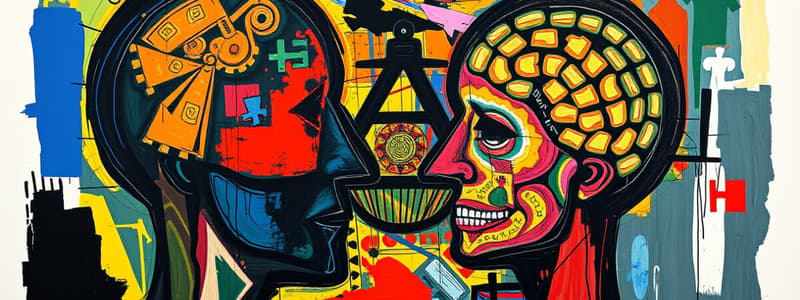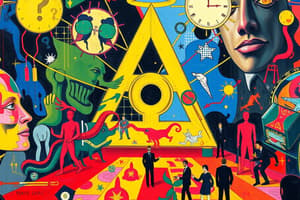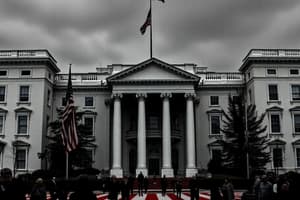Podcast
Questions and Answers
What distinguishes a conspiracy theory from a regular conspiracy?
What distinguishes a conspiracy theory from a regular conspiracy?
- Conspiracy theories can only involve two people.
- Conspiracy theories promote a political viewpoint. (correct)
- Conspiracies are always true.
- Conspiracy theories are based on solid evidence.
Which of the following is an example of a conspiracy theory mentioned in the content?
Which of the following is an example of a conspiracy theory mentioned in the content?
- The Gunpowder plot was a failed assassination attempt.
- Lee Harvey Oswald acted alone in JFK's assassination.
- Bill Gates uses vaccines to monitor people. (correct)
- World War II was fought for humanitarian reasons.
How are people who believe in controversial conspiracy theories referred to?
How are people who believe in controversial conspiracy theories referred to?
- Theorists
- Skeptics
- Conspiracy theorists (correct)
- Critics
What characterizes the reasoning used in conspiracy theories?
What characterizes the reasoning used in conspiracy theories?
Who are conspiracy skeptics?
Who are conspiracy skeptics?
What was the official account of the Sandy Hook incident?
What was the official account of the Sandy Hook incident?
What is a common misconception about conspiracy theories?
What is a common misconception about conspiracy theories?
Which of the following statements is true about conspiracy theories and the individuals who promote them?
Which of the following statements is true about conspiracy theories and the individuals who promote them?
What is a common characteristic of conspiracy theories?
What is a common characteristic of conspiracy theories?
Which bias leads individuals to seek evidence that supports their existing beliefs?
Which bias leads individuals to seek evidence that supports their existing beliefs?
What can be inferred about the worldview of conspiracy theorists compared to the modern worldview?
What can be inferred about the worldview of conspiracy theorists compared to the modern worldview?
What term describes the fundamental idea that those in power are concealing information from the public?
What term describes the fundamental idea that those in power are concealing information from the public?
How does the intentionality bias affect people's perception of events?
How does the intentionality bias affect people's perception of events?
What role do amateur sleuths typically have in conspiracy theories?
What role do amateur sleuths typically have in conspiracy theories?
What is the significance of the statement 'truth is stranger than fiction' in relation to conspiracy theories?
What is the significance of the statement 'truth is stranger than fiction' in relation to conspiracy theories?
Why might someone who believes in one conspiracy theory be more likely to believe in others?
Why might someone who believes in one conspiracy theory be more likely to believe in others?
Flashcards are hidden until you start studying
Study Notes
Understanding Conspiracy Theories
- A conspiracy involves 2 or more individuals secretly plotting together.
- Conspiracy theories often contradict official narratives and are lacking solid evidence.
Examples of Prominent Conspiracy Theories
- Anti-Vaccine Theory: Claims that Bill Gates uses vaccines to sterilize women in Africa and implant microchips for control.
- Holocaust Denial: Asserts that WWII's concentration camps did not result in the murder of millions of Jews, suggesting a manipulation by Israelis.
- JFK Assassination: Officially attributed to Lee Harvey Oswald. The theory proposes a 'deep state' arrangement for the assassination, where Oswald was silenced to hide the truth.
- Sandy Hook Shooting: Official account: Adam Lanza killed 26 people in 2012. Conspiracists argue it was staged by Democrats to promote anti-gun legislation, claiming no real deaths occurred.
Terminology
- Conspiracy Sceptics: Individuals who reject controversial conspiracy theories as irrational.
- Conspiracy Theorists: Those who give credence to controversial theories or believe in them rationally.
Cassam's Features of Conspiracy Theories
- Speculative: Based on guesswork rather than robust evidence.
- Contrarian: Typically oppose official accounts and societal perceptions.
- Esoteric: Suggest simple explanations are inadequate; reality is deemed inconsistent with appearances.
- Amateur: Often lack expert knowledge, relying instead on personal investigations.
- Pre-modern Worldview: Assume that major events must have underlying meanings, opposing the modern view of random occurrences.
Purpose and Psychological Factors
- Propaganda: Used to promote political agendas.
- Exposure of Lies: Belief among theorists that conspiracy theories reveal hidden truths.
- Cognitive Biases:
- Intentionality Bias: The tendency to believe events are planned rather than accidental.
- Confirmation Bias: The inclination to seek information that reaffirms existing beliefs while disregarding opposing views.
- Proportionality Bias: Belief that significant events must have equally significant causes.
Ideology and Conspiricism
- Ideology: Fundamental beliefs influencing political understanding; includes Marxism and racism.
- Conspiricism: The belief that authorities are concealing information for nefarious purposes, often leading to acceptance of various conspiracy theories.
- Belief in one conspiracy theory increases the likelihood of accepting others, regardless of their contradictions.
- Right-wing extremists are notably active in promoting conspiracy theories, especially those with anti-Semitic elements.
Studying That Suits You
Use AI to generate personalized quizzes and flashcards to suit your learning preferences.




